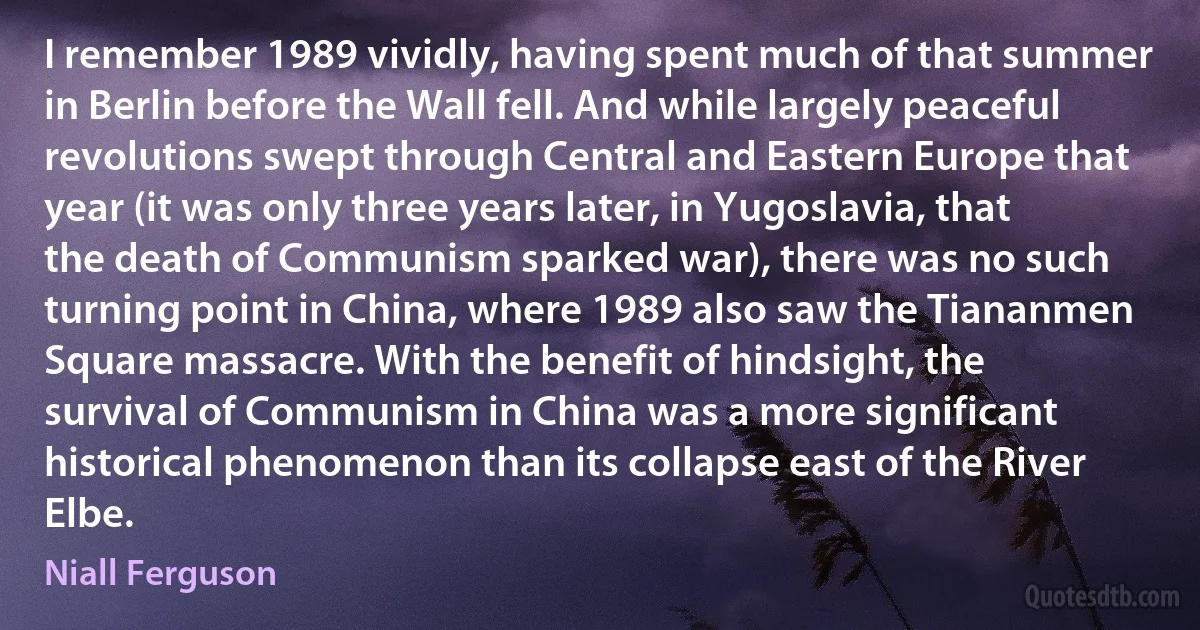River Quotes - page 38
I remember one evening on the Tamar [river in South-west England]; the sun had set, and the shadows become very deep. Demaria, looking at a seventy-four [ship] lying under Saltash in Cornwall, said, 'You were right, Mr. Turner; the ports cannot be seen. The ship is one dark mass'. 'I told you so', said Turner: 'now you see it all is one mass of shade'. 'Yes, I see that is the truth, and yet the ports are there'. [Turner:] 'We can take only what we see, no matter what is there. There are people in the ship: we don't see them through the planks'. 'True', replied Demaria. There had been a discussion on the subject before between the two professional men, in which Turner had rightly observed that after sunset, under the hills, the port-holes were undiscernible. We now had ocular proof of it.

J. M. W. Turner
Turner visited Plymouth (my native town) while I was staying there in the summer of 1813, or perhaps 1814 (1812 ?), painting portraits. As he wished to see the scenery of the river Tamar - [river in South-west England], I accompanied him, together with Mr. Ambrose Johns from Plymouth.. ..to a cottage near Calstock, the residence of my aunt, Miss Pearce, where we all stayed for a few days. From that point as a centre Turner made various excursions, and the result of one of his rambles was a sketch of the scene which afterwards grew into the celebrated picture of the painting 'Crossing the Brook'. The bridge in that picture is Calstock Bridge; some mining works are indicated in the middle distance. The extreme distance extends to the mouth of the Tamar, the harbour of Hamoaze, the hills of Mount Edgcumbe, and those on the opposite side of Plymouth Sound. The whole scene is extremely faithful.

J. M. W. Turner
Sometime afterward, a terrible misfortune occurred which was in no way calculated to allay the superstitious fears of the ignorant. As some eight or ten citizens were returning with the ferry-boat which had crossed the last Mormons over the Missouri river, into Clay county, the district selected for their new home, the craft filled with water and sunk in the middle of the current; by which accident three or four men were drowned! It was owing perhaps to the craziness of the boat, yet some persons suspected the Mormons of having scuttled it by secretly boring auger-holes in the bottom just before they had left it.

Josiah Gregg
After leaving El Paso, our road branched off at an angle of about two points to the westward of the river, the city of Chihuahua being situated nearly a hundred miles to the west of it. At the distance of about thirty miles we reached Los Médanos [The Dunes], a stupendous ledge of sand-hills, across which the road passes for about six miles. As teams are never able to haul the loaded wagons over this region of loose sand, we engaged an atajo of mules at El Paso, upon which to convey our goods across. These Médanos consist of huge hillocks and ridges of pure sand, in many places without a vestige of vegetation. Through the lowest gaps between the hills, the road winds its way.

Josiah Gregg
We now continued our journey without encountering any further casualty, except in crossing the Arkansas river, where we lost several mules by drowning; and on the 22d of April we made our entrance into Van Buren. This trip was much more tedious and protracted than I had contemplated - owing, in the first part of the journey, to the inclemency of the season, and a want of pasturage for our animals; and, towards the conclusion, to the frequent rains, which kept the route in a miserable condition.

Josiah Gregg
The Texans now advanced along the Santa Fé road, beyond the sand hills south of the Arkansas, when they discovered that a party of Mexicans had passed towards the river. They soon came upon them, and a skirmish ensuing, eighteen Mexicans were killed, and as many wounded, five of whom afterwards died. The Texans suffered no injury, though the Mexicans were a hundred in number. The rest were all taken prisoners except two, who escaped and bore the news to Gen. Armijo, encamped with a large force at the Cold Spring, 140 miles beyond. As soon as the General received notice of the defeat of his vanguard, he broke up his camp most precipitately, and retreated to Santa Fé. A gentleman of the caravan which passed shortly afterward, informed me that spurs, lariats and other scraps of equipage, were found scattered in every direction about Armijo's camp - left by his troops in the hurly-burly of their precipitate retreat.

Josiah Gregg
He felt a killing hate for the stupid, ordinary, disapproving people who kept him from doing what he wanted to do. "Someday I am going to have things just like I want," he said to himself. "And if any moralizing son of a bitch gives me any static, they will fish him out of the river.

William S. Burroughs
In a letter to Sir John Hall, he says that he was become very fond of studying the surface of the earth, and was looking with anxious curiosity into every pit, or ditch, or bed of a river that fell in his way; "and that if he did not always avoid the fate of Thales, his misfortune was certainly not owing to the same cause." This letter is from Yarmouth; it has no date, but it is plain from circumstances that it must have been written in 1753.

James Hutton
In America you can ease into middle age with the accoutrements of adolescence still prominent and suffer relatively minor embarrassment: okay, so the guy's still got his sideburns and rod and beer and beergut and wife and three kids and a duplex and never grew up. So what? You're not supposed to grow up in America. You're supposed to consume. But in Britain it seems there is some ideal, no, some dry river one is expected to ford, so you can enter that sedate bubble where you raise a family, contributing in your small way to your society and keep your mouth shut. Until you get old, that is, when you can become an "eccentric" - do and say outrageous things, naughty things, because it's expected of you, you've crossed to the other mirror of the telescope of childhood.

Lester Bangs
Witzel‘s location of the Sarasvatī in Book 2 in Afghanistan is not an honest one: he does it only because he wants a Rigvedic Book which refers only to western rivers, in order to show the Vedic Aryans ―fighting their way through the NW mountain passes in their alleged movement from west to east, and Book 2 is his only option, since the name of only this one river is mentioned in the whole of this Book, and it is a name which can be manipulated from east to west by creating a dual entity (thanks to the existence of a Sarasvatī, the Avestan Harahvaiti, in Afghanistan).

Shrikant Talageri
Witzel takes up two verses which clearly refer to eastern rivers, misinterprets them as references to the Indus, further misinterprets them as references to crossings of the Indus river from west to east, and then reconstructs an entire saga of the immigration of the Rigvedic Aryans into India on the basis of these misinterpretations. He even pinpoints the exact area "eastern Iran” from which specific immigrants, "the Bharatas and VasiSTha”110, led this historical exodus across the Indus.... Is "gross misrepresentation” an adequate word to describe this whole exercise?... His sole criterion in preparing a chronological arrangement is his own geographical grid prepared on the basis of deliberate misinterpretations of Rigvedic geography.

Shrikant Talageri
We are all familiar with the idea: Give a man a fish and you'll feed him for a day, but teach a man to fish and you'll feed him for a lifetime. That sounds reasonable enough. ... But think of the model that rests on. It constructs people in developing countries that sort of people sitting by the rivers and eating fish and then they look at the river and said: "- So what's that? - It looks like a fish. - Well, how do we get it out? - Well I have no idea, we would have to wait for white man to come and tell us." It's important to remember that actually there are systems of governance that already exist. There are models of development that already exist in developing countries that actually are much more sustainable than the model of free markets that we have been trying to export.

Raj Patel
Jesus then realized he had been brought here under false pretences, as the lamb is led to sacrifice and that his life had been planned for death since the very beginning. Remembering the river of blood and suffering that would flow from his side and flood the entire earth, he called out to the open sky where God could be seen smiling, Men, forgive Him, for He knows not what He has done.

Jesus Christ
USSS 1: I am beginning to get concerned messages from people in the Pentagon wanting to know why Backhoe is incommunicado.
DOSECOPS C4: The Pentagon?
USSS 1: The Trapezoid. Was my transmission garbled?
DOSECOPS C4: Sorry, I was distracted. I thought you said Pentagon.
USSS 1: I'm a little foggy myself with all of the weirdness around here and I may have said the wrong thing. I am referring to the [GARBLED]. The very large building across the Potomac River from DC that is the headquarters of the United States military. Does that help clarify matters?
DOSECOPS C4: Sure. The Pentagon.
USSS 1: That's what I'm saying!

Neal Stephenson
We should prepare to go over to the offensive with the aim of smashing Lebanon, Transjordan, and Syria....The weak point in the Arab coalition is Lebanon [for] the Moslem regime is artificial and easy to undermine. A Christian state should be established, with its southern border on the Litani River [within Lebanon]. We will make an alliance with it. When we smash the [Arab] Legion's strength and bomb Amman, we will eliminate Transjordan too, and then Syria will fall. If Egypt still dares to fight on, we shall bomb Port Said, Alexandria, and Cairo.

David Ben-Gurion
Water and navigation had that role to play. Locked in the ship from which he could not escape, the madman was handed over to the thousand-armed river, to the sea where all paths cross, and the great uncertainty that surrounds all things. A prisoner in the midst of the ultimate freedom, on the most open road of all, chained solidly to the infinite crossroads. He is the Passenger par excellence, the prisoner of the passage. It is not known where he will land, and when he lands, he knows not whence he came. His truth and his home are the barren wasteland between two lands that can never be his own. [...] One thing is certain: the link between water and madness is deeply rooted in the dream of the Western man.

Michel Foucault



